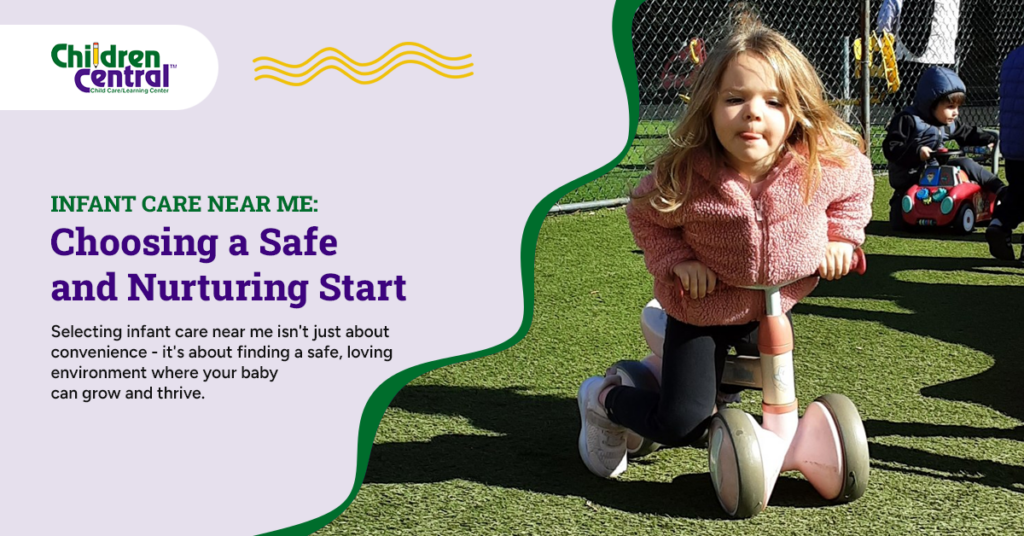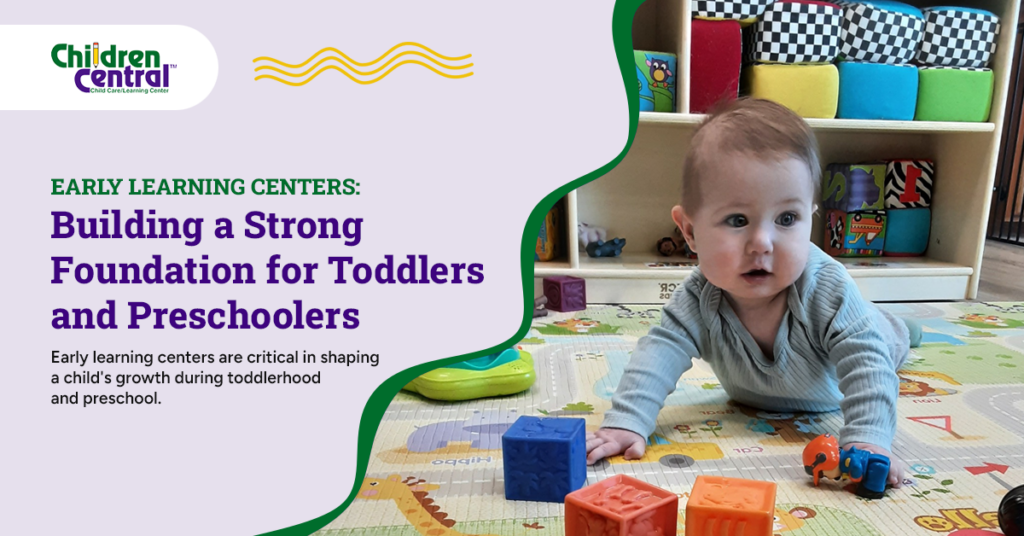When searching for top rated daycares near me, finding a place that genuinely feels like a second home for your child is essential. Choosing the right daycare is more than just a convenient location; it provides a nurturing environment where children can thrive socially, emotionally, and academically.
This guide will help you comprehend what to look for in daycare so you can confidently select a center that aligns with your family’s values and gives your child the best start possible. Discover how to find the ideal daycare for your little one—a place that fosters growth, fun, and lifelong friendships.
Understanding Different Daycare Programs and What They Offer
Selecting the right daycare program is about more than just finding a safe place for your child. It involves choosing an environment that supports your child’s growth through engaging activities and structured learning. Daycare programs come in various formats, each catering to different developmental needs, learning styles, and family values. Let’s explore some of the most popular options available and how they can benefit your child.
Play-Based Programs: Encouraging Exploration and Creativity
Play-based daycare programs focus on child-led exploration, where learning occurs naturally through activities like pretend play, art, and outdoor games. These programs aim to nurture children’s creativity and social skills in a relaxed setting, allowing them to learn at their own pace.
In a play-based setting, your child will engage in various activities that support multiple aspects of development, such as:
- Social Interaction: Encourages children to play with others, fostering friendships and teamwork.
- Creativity Boost: Provides open-ended toys and art supplies to stimulate imagination.
- Self-Confidence: Empowers children to make choices, building independence and decision-making skills.
Play-based programs are ideal for children who thrive in a flexible, interactive environment. They emphasize developing a love of learning through hands-on activities, making them an excellent choice for early childhood development.
Academic Programs: Preparing for School Readiness
Academic daycare programs introduce young children to foundational academic skills, focusing on pre-reading, math, and problem-solving. These programs often follow a set curriculum to ensure children build essential skills before starting school, making them suitable for parents who want an educational head start for their child.
In academic-based programs, children participate in structured activities that support early learning, such as:
- Literacy Activities: Introduce children to letters and sounds, promoting early reading.
- Math Foundations: Engages children with numbers and counting through fun games.
- Problem-Solving Tasks: Encourages children to think critically and develop solutions.
These programs help children transition smoothly to a classroom setting by promoting school readiness skills. If your child shows curiosity for letters, numbers, and structured tasks, an academic program may be an excellent choice.
Montessori Programs: Fostering Independence and Self-Discovery
Montessori programs encourage children to take the lead in their learning by choosing activities that interest them. This self-paced, discovery-based approach fosters independence as children work in a prepared environment that supports their natural development.
Montessori settings are designed to help children develop essential life skills through activities such as:
- Self-Care Skills: Teaches children to manage tasks like dressing or snack preparation.
- Focused Learning: Provides uninterrupted work time to improve concentration and patience.
- Respect for Environment: Instills responsibility by involving children in cleaning and organizing.
For families who value independence and a personalized approach to learning, Montessori programs offer a unique, child-centered experience that builds lifelong learning skills.
Language Immersion Programs: Introducing Bilingual Skills Early
Language immersion programs expose children to a second language through everyday activities and play. This early introduction to bilingualism can enhance cognitive flexibility and foster cultural awareness, giving children valuable skills for the future.
In these programs, children engage in activities that support language acquisition, such as:
- Daily Conversations: Instructors communicate in the target language, building comprehension.
- Songs and Rhymes: Uses music and repetition to reinforce vocabulary naturally.
- Interactive Play: Creates a playful environment where children learn words and phrases.
Language immersion programs are ideal for families who want their children to develop bilingual skills, enhance their communication abilities, and gain a cultural understanding.
Infant Care Near Me: Choosing a Safe and Nurturing Start

Selecting infant care near me isn’t just about convenience—it’s about finding a safe, loving environment where your baby can grow and thrive. Quality infant care focuses on providing a nurturing atmosphere that promotes healthy development so your little one feels secure and supported. Here’s a closer look at what to look for in infant care to give your baby the best start possible.
What to Look for in Infant Care
Evaluating the center’s approach to safety, care routines, and infant interactions is essential when choosing infant care. The right program will offer a safe, clean environment and a thoughtful approach to meeting your baby’s unique needs.
Consider the following aspects as you evaluate potential options:
- Safety Standards: Ensures the facility meets health and safety regulations, including regular cleaning protocols and emergency preparedness.
- Staff Qualifications: Requires caregivers with experience and credentials in infant care, ensuring your baby is in capable hands.
- Low Caregiver-to-Infant Ratio: Maintains a low ratio to provide personalized attention, enhancing the quality of care and supervision.
Choosing a center with these elements helps ensure your baby will be cared for in a safe, well-supervised environment to meet their developmental needs.
Daily Routines That Support Development
Infants thrive on consistency, and a well-structured routine in a childcare setting offers a balance of stimulation and comfort. Look for programs that follow routines that support physical and emotional growth, such as feeding, sleeping, and play schedules.
Quality infant care centers often structure routines with development in mind, incorporating:
- Feeding Schedules: This schedule adapts to your baby’s specific feeding needs, whether breast milk, formula, or starting solids.
- Nap Times: Aligns with your baby’s natural sleep rhythms to promote healthy rest habits.
- Gentle Play and Tummy Time: Includes safe, age-appropriate activities to strengthen motor skills and encourage exploration.
Daily routines tailored to infants create a comforting environment that encourages their development and helps them feel at ease in their surroundings.
A Nurturing Environment for Growth
Beyond safety and routines, an infant care program’s emotional climate is essential. Infants need caregivers who are attentive, compassionate, and responsive to their cues. Look for programs that foster meaningful interactions between caregivers and babies, as these connections are crucial for early emotional and social development.
Critical elements of a nurturing environment include:
- Responsive Care: Caregivers respond promptly to babies’ needs, promoting security.
- Soothing Techniques: Staff use gentle methods, like rocking or singing, to comfort and calm infants.
- Social Interaction: Encourages babies to observe and interact with other infants, supporting social awareness.
Choosing an infant care program that prioritizes emotional nurturing alongside physical care provides a foundation of trust, helping your baby feel safe and loved in their early days outside the home.
Early Learning Centers: Building a Strong Foundation for Toddlers and Preschoolers

Early learning centers are critical in shaping a child’s growth during toddlerhood and preschool. These centers focus on providing a stimulating setting where young children can explore, learn, and gain critical skills that prepare them for future education. From nurturing creativity to building social awareness, early learning centers are dedicated to creating a solid foundation that supports lifelong learning.
Curriculum-Based Learning for Holistic Development
A structured curriculum is often at the heart of quality early learning centers. These curricula are carefully designed to address various aspects of child development, including cognitive, social, and physical growth. They ensure children are exposed to a well-rounded learning experience supporting every development area.
Vital elements of curriculum-based learning may include:
- Literacy Activities: Introduces children to letters, sounds, and storytelling, promoting language development and early reading skills.
- Mathematics Exploration: Uses hands-on activities introducing numbers, shapes, and patterns, building foundational math skills.
- Science and Nature: Encourages curiosity by exploring the natural world, fostering critical thinking and observational skills.
A curriculum-based approach ensures that children receive a balanced education that touches on every development aspect, preparing them for a flawless transition into formal schooling.
Structured Play for Skill Building
Play is an essential part of early learning, and high-quality centers incorporate structured play activities that are engaging and educational. These activities encourage children to learn through fun, interactive experiences, developing critical skills in a playful setting.
Everyday structured play activities include:
- Sensory Play: Allows children to explore textures, sounds, and colors, enhancing sensory development and cognitive skills.
- Role-playing and Imaginative Play: Pretending to be characters or professionals helps children understand social roles and builds communication skills.
- Physical Games: Promotes coordination, balance, and motor skills through obstacle courses, ball games, and dancing.
Structured play provides children with valuable learning experiences in a way that feels natural and enjoyable, promoting physical and social growth.
Social and Emotional Development in a Supportive Environment
Early learning centers are not just about academics—they are also places where children learn how to interact with others and understand their emotions. These centers create a supportive environment that fosters social awareness, empathy, and self-regulation.
Components of a supportive social environment include:
- Group Activities: Encourages teamwork and cooperation, helping children learn to work with peers and build friendships.
- Guided Problem-Solving: Teaches children how to navigate conflicts and find solutions, building resilience and empathy.
- Positive Reinforcement: Caregivers use praise and encouragement to promote positive behavior, boosting children’s self-confidence.
Focusing on social and emotional development helps children build crucial interpersonal skills and a strong sense of self, preparing them for interactions inside and outside the classroom.
Conclusion
Choosing the right daycare for your child is one of the most impactful decisions, setting the stage for a lifetime of learning, growth, and happiness. With so many options—from play-based programs to academic-focused centers and nurturing infant care—finding a center that aligns with your family’s needs ensures your child thrives in a supportive, engaging environment. Early learning centers, in particular, provide a foundation that nurtures curiosity, builds social skills, and supports emotional development, helping children transition smoothly into school and beyond.
At Children Central, we’re dedicated to giving each child a safe, enriching experience that sparks joy and discovery every day. If you’re ready to explore top-rated childcare options that match your child’s needs and your family’s values, reach out today! Call us at (215) 398-1076 or visit our contact page to learn more. Your child’s best start awaits!



